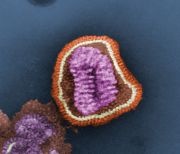NICE renewed flu guidance
The next flu season will come. To prevent high-risk people from infections, the National Institute for Health and Clinical Excellence (NICE) recently published a final guidance on the use of the drugs oseltamivir, amantadine and zanamivir for the prophylaxis of influenza. "But vaccination is the main way to prevent flu", says Gillian Leng, NICE Deputy Chief Executive.

NICE guidance recommends oseltamivir and zanamivir for the post-exposure prophylaxis or prevention of ’flu if all of the following circumstances apply:
- National surveillance schemes have indicated that influenza virus is circulating
- The person is in an at-risk group
- The person has been exposed to a person with a ‘flu-like illness and is able to begin prophylaxis within the timescale specified for the individual drugs - within 36 hours for zanamivir and within 48 hours for oseltamivir
- The person has not been effectively protected by vaccination
During localised outbreaks of ‘flu-like illness guidance recommends oseltamivir and zanamivir be used for people living in long-term residential or nursing homes who have been in contact with the illness, whether or not they are vaccinated. However, this should be done only if there is a high level of certainty that the cause of the localised outbreak is influenza.
This guidance does not cover the circumstances of a pandemic, an impending pandemic, or a widespread epidemic of a new strain of influenza to which there is little or no community resistance. Oseltamivir and zanamivir are not recommended for general use during ‘flu season for prevention of the illness, unless the circumstances above apply. Amantadine is not recommended for the prophylaxis of influenza.
Dr Gillian Leng, NICE Deputy Chief Executive, and Executive Lead for this guidance said: “With the ‘flu season fast approaching, NICE has reviewed and extended it’s guidance on drug treatments for prevention of the illness. Although the majority of people who get ‘flu get better with in 1-2 weeks, some develop more serious problems such as chest infections. People who live in residential accommodation, such as care homes, or who are in other healthcare settings are at greater risk of becoming infected.
“Vaccination is the main way to prevent flu and the Department of Health currently recommends that people who are at risk of ‘flu infection or complications are vaccinated at the beginning of each winter. Oseltamivir and zanamivir can be used as an additional treatment option as they work in a way that stops the virus from multiplying in the body.”
About the guidance
1. The oseltamivir, amantadine and zanamivir for the prophylaxis of influenza guidance is
available at: http://www.nice.org.uk/TA158
2. For the purpose of this guidance, people at risk are defined as those who fall into one or more of the clinical risk groups defined, and updated, each year by the Chief Medical Officer. The current list includes people with:
- •chronic respiratory disease (including asthma that requires continuous or repeated use of inhaled or systemic steroids or with previous exacerbations requiring hospital admission)
- chronic heart disease
- chronic renal disease
- chronic liver disease
- chronic neurological disease
- immunosuppression
- diabetes mellitus
People who are aged 65 years or older are also defined as at-risk for the purpose of this guidance.
3. Exposure to an influenza-like illness is defined as close contact with a person in the same
household or residential setting who has had recent symptoms of influenza.
4. People who are not effectively protected by vaccination include:
- those who have not been vaccinated since the previous influenza season
- those for whom vaccination is contraindicated, or in whom it has yet to take effect
- those who have been vaccinated with a vaccine that is not well matched (according
- to information from the Health Protection Agency) to the circulating strain of influenza
- virus.
02.10.2008











